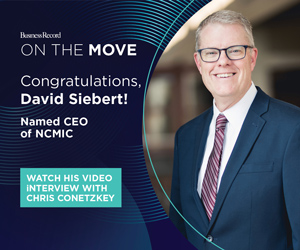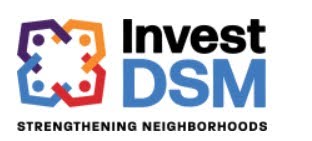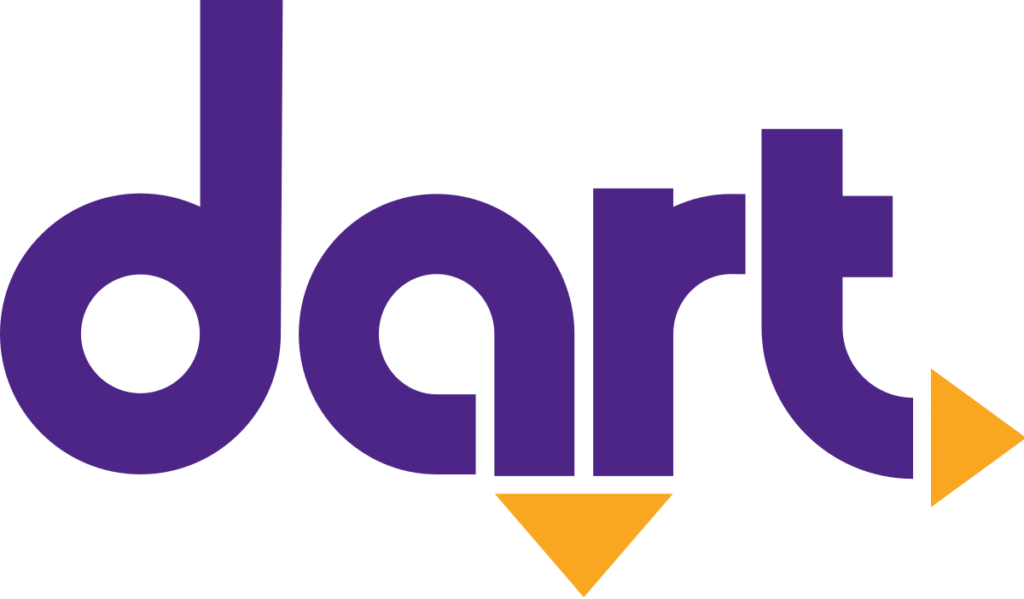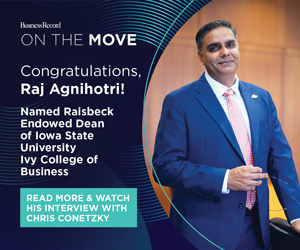Wish list for the 2019 Iowa Legislature
Business group leaders know what they are looking for — support and growth for the state’s workforce

SUZANNE BEHNKE Dec 18, 2018 | 8:43 pm
14 min read time
3,258 wordsAll Latest News, Business Record Insider, Government Policy and Law, Retail and Business, VideoHands shot up. Questions and comments zigged and zagged over topics such as affordable housing, a new terminal for the Des Moines airport, education funding, supporting rural communities, and other matters.
The Dec. 6 Business Record event, “The Newsroom: Legislative Outlook,” took time to examine what might come up in the 2019 Iowa Legislature that will be important to the business community in not just Greater Des Moines but the state overall.
One issue cropped up over and over: the need for a skilled workforce and how to support those employees. In the 2018 session, lawmakers approved the Future Ready Iowa initiative. The next step, panelists said, is to fund it. More on that later. Lawmakers in 2018 also worked on and passed tax reform. Leaders recently said at a Greater Des Moines Partnership panel that there’s some cleanup needed on that topic.
The Dec. 6 event’s four panelists, all key professionals who will be at the Statehouse when the Iowa Legislature begins its work Jan. 14, put labor and labor readiness at the top of the list. Agreed, said the audience of roughly 50 attendees. The Q&A portion of the event turned into a robust discussion on how to best attract workers and meet their needs.
The following questions and answers are excerpts of the dialogue from the event. Remarks come from the following: Nicole Crain, senior vice president of public policy, Iowa Association of Business and Industry; Georgia Van Gundy, executive director, Iowa Business Council; Joe Murphy, senior vice president of public policy and government relations, Greater Des Moines Partnership; and Joseph Jones, executive director, Harkin Institute for Public Policy & Citizen Engagement.
Please note that the event took place before legislative agendas had been released for some of the panelists’ organizations. Also, the Business Record is an apolitical media outlet; it does not cover political races but does cover business-related issues that lawmakers will address.
A full video of the event is available to Business Record Insiders at
BusinessRecord.com.
TOP ISSUES TO CONSIDER
Business Record: What is the top issue that you would like to see come up in the Iowa Legislature this year, and why?
Nicole Crain: I think for the Association of Business and Industry — we represent 1,500 companies around the state of Iowa — one thing that we continue to hear and have heard for several years is about workforce, and really I think we got a great start on that last year with the Future Ready Iowa legislation. This year I think we need to take it a step further and get some appropriations for the Future Ready Iowa legislation, making sure that we have qualified workers, whether it be in the construction industry, manufacturing, financial, that we can keep people here in Iowa and make sure that they’re qualified and ready to go to work. So that’s one thing that I know. A lot of the other panelists will have the same thing to say as well. It’s one thing that we just keep hearing over and over.
Joe Murphy: I’d agree with what Nicole said. Obviously, workforce and a Future Ready Iowa initiative is something that the [Greater Des Moines] Partnership has been a full supporter of since the beginning. So I will say, although we support workforce initiatives, I’m really hopeful and the Partnership’s very hopeful for the Legislature to take a strong look at airport funding and building an international airport. There is a critical need, I think, for expanded service for air travel here in this region when you think about the economic benefit that that will have not only for the region but for the entire state. When you look, as the Business Record often publicizes, the year-over-year and month-over-month [passenger] statistics that continue to increase. As we think about what we need to do moving forward to get our region to the next level, upgrading our existing facilities at the airport is a huge undertaking and it will certainly invite some state legislative action.
Georgia Van Gundy: I represent 23 of our larger companies in the state of Iowa, and obviously we also hear about workforce as a concern. For those who don’t necessarily know what the Future Ready Iowa initiative is, it’s a statewide strategy to help train Iowans. There is a goal to have 70 percent of Iowans have some form of credentialing or education by the year 2025, and it’s a strategy that everyone can find a way to plug into and work on so that collectively as a state we can try to accomplish some of our goals with the workforce.
Two programs in particular, the Last Dollar Scholar program passed last year, and that’s for students that are going into high-demand
careers and it allows them the opportunity to get a scholarship to go into those careers, and then the other one is the employer Innovation Fund. So the employer Innovation Fund would allow for communities to come together, they look at what their workforce needs are, what are some of the barriers getting people employed or moving them into high-demand jobs. That’s a pool of funds that can be matched by the state through that employer innovation fund. We’d like to see both the Last Dollar Scholar and the employer Innovation Fund funded during the next legislative session.
Joseph Jones: The Harkin Institute actually does not lobby or have any advocacy. What we do is research on public policy, and most of it is federal policy that we look at, but there are a lot of things that have state implications and obviously are administered by the state.
In terms of workforce, where we can look is at some of the marginalized groups, so it’s people who have records, people who might have disabilities, maybe new Americans need to move to Iowa. We have to think about those types of things as we consider talking about our next focus on the workforce. We also have to consider, I think, some of those practices that we do with medical leave and sick leave but also thinking about child care and thinking about people who are in a caregiver position for an older family member or somebody who has a disability. Then thinking big-picture about some of those people who live in remote areas. So remote employees, remote businesses, and that goes back to infrastructure, so thinking about high-speed internet, broadband across our state. … That’s my take on where that should all roll into for 2020.
UNEMPLOYMENT RATE
Business Record: Iowa’s unemployment rate has been declining for the last few years, which sounds good but means that we have few workers available for the jobs that are open. [In October, the latest numbers available from Iowa Workforce Development, Iowa’s seasonally adjusted unemployment rate dropped to 2.4 percent, only the fifth time since record-keeping started in 1976 that the monthly rate has been that low. The U.S. rate was 3.7 percent.]
Georgia Van Gundy: Well, first of all it’s a good point to talk about. I think we rank second as far as our unemployment rate, but on top of that we rank fourth as a state as far as workforce participation. So already we have a lot of people who are in the workforce. … We’re moving people around from company to company.
I can tell you one of the areas that our members are looking at is population diversity. How do we increase the population of our state? We have not increased our population. In fact, we’re one of the only states that hasn’t increased our population at least 50 percent since 1900 to 2010, and so what are some strategies that we need to all be taking a look at to increase the population of the state? That’s what’s really going to help solve that issue so that we’re not taking employees from each one of the companies around the state.
Business Record: Do you know if there’s any specific ideas out there that might be floating around on that topic?
Georgia Van Gundy: For us, we’re going to put together a public-private group to come together and do some research and take a look at that and what are some of the initiatives that we could be taking a look at and asking our lawmakers to consider, or there could be policies that necessarily our lawmakers don’t have to take a look at. We’re going to be putting together that group here at the end of the year, and it’ll be our members but then other people as well, leaders, and then gathering data that we need and making some decisions on that.
Nicole Crain: We don’t have enough people in Iowa. We need more people here and … from time to time we do see policies on a state level that could affect the ability to bring people into Iowa, and that’s something that we’ll be watching for as an association and making sure that there aren’t any policies that would make it more difficult to bring workers, and to make sure that we have the high quality of workers and those high-quality jobs here in Iowa. We need all the people that we can get here in Iowa, so that’s something at the state level, just based on some recent events, that we think that there could be some state-level initiatives and something that we’re going to be watching for from the ABI perspective.
GETTING WORKERS AND SUPPORTING THEM
One major takeaway came when an attendee asked what efforts were being made to work with specific groups of potential employees, such as the Iowa Business Council’s work with veterans. A big initiative is the Future Ready Iowa program, which got attention at the event from panelists and from the audience.
Here are some excerpt from the panel on efforts to work with specific populations such as refugees or workers with disabilities:
Georgia Van Gundy: I’ll tell you what we are working on, and it is part of the Future Ready Iowa initiative in which — we’re looking for recommendation number five if anybody wants to go out there and look — it deals with communities really coming together at the local level and determining what are those barriers, and oftentimes it is within these populations. So is it that there’s not enough child care for low-income individuals? Is it the fact that there’s not transportation to get to work? What are those actual barriers for people to get to work and then that innovation fund that we talked about is what can we use to break down those barriers. So we’re going to continue to have those conversations community by community to see what those are and help with that, and businesses will put their money toward those funds, but it really kind of has to be more of that grass-roots, regional approach.
Joseph Jones: I would say that the two things that we’re doing research on right now, one is on the child care “cliff effect” and that looks like what we’re hearing from the people who have been receiving child care assistance and why they do or do not stay in certain jobs or what the recruitment issue or the retainment issue has been. So hopefully in the next, I don’t know, six months to a year we’ll have some final data results on that, which I think will be really helpful.
The “cliff effect” is essentially people who can’t take a raise or can’t take extra cash because when they get to a certain income level they lose child care assistance. So you might end up with an extra $250 a year but you lose several thousand dollars a year in child care assistance through this program.
So that’s the short snippet of what happens, and so it becomes a question of do you want to stay in the workforce? Then you have to kind of artificially keep your wage down because you need to be able to afford child care and you can’t really take those promotions and take those raises because once you get to a certain point, then the funding’s not there and you’ve lost too much money now, and now you can’t afford child care. It’s called a cliff effect if you get to a certain income and then you fall off.
And so we’re hoping that with the information that we have and the data that we’re working on with our partners, we can get some good results and make some recommendations for all 50 states as they use the child care assistance program from the federal government.
Joe Murphy: These are good examples, I think, of demonstrating a really direct problem that we’re currently facing in the workforce. On the surface, it seems, “Gosh, we should just be able to fix it like that.” But what these two just really did a great job talking about is how complex and how intense these issues are and how much stock needs to go into it to make sure that, No. 1, it doesn’t make the problem any worse, but, No. 2, it actually provides a plan for success for these individuals to come off programs or to get them into assistance because they’re doing everything else right.
I do want to say that the good thing about the Iowa Legislature, despite the election that happened 31 days ago and all the heated rhetoric and everything else on that, our legislators really do get along on a wide variety of issues quite well and these examples are some of the issues that they really get along well on, and so you’ve got both members, both leaders and both caucuses, talking about ways to address specifically the cliff effect this year as well as some of these other workforce problems with different populations in our communities to get more people in the workforce and get them mobilized in a way that will not only help them — obviously, most importantly — but then also help the longer term.
HOUSING
One attendee specifically asked how to assist rural Iowa communities that need to attract workers. One barrier is affordable housing. It’s a statewide issue, most agreed. Here are some comments on that topic:
Nicole Crain: Like the Partnership, ABI also has that as one of our priorities, and we’re hearing it, too, not just in Des Moines area but in rural areas. Not just like I said affordable housing but adequate housing, and we talked about the child care cliff and those income levels, and that’s part of the struggle too with housing and having adequate housing in some of those rural areas. You also have homes that have been lived or maybe not lived in for a few years. How can you rehab those homes, and how can you do infield development?
It’s something that we’re looking at in the association. With it being statewide, there’s a lot of great things going on. We want to make sure that we see what those are, understand those better, and make sure they’re not trying to do a one size fits all — because what works in Wayne County or Taylor County might not work here in Des Moines County or might not work in Cerro Gordo County. So that’s something that I think there’s a lot of discussion still to be had on that issue.
AGENDAS FOR SOME MAJOR BUSINESS GROUPS
Greater Des Moines Partnership
The Greater Des Moines Partnership this month released its platform for the next session of the Iowa Legislature. The biggest priorities feature some familiar topics. The full list of priorities is here.
The top items include:
Talent. Expand on Future Ready Iowa Act by providing funding for the Last Dollar Scholar program and the Iowa Employer Innovation Fund. The Partnership also supports policies that increase access to quality and affordable child care assistance without penalizing people who take low-paying jobs.
Water trails. Noting that individuals and businesses already have supported plans to create 80 Central Iowa water trails — including an adventure park in downtown Des Moines — the Partnership called for “adequate and permanent funding sources” for the work. Among the funding options supported: passage of a bill raising the sales tax to fund the voter-approved and constitutionally protected Natural Resources and Outdoor Recreation Trust Fund, a package of tax credits and “market-based approaches.”
New Des Moines airport terminal. The platform calls for increased funding for state airport assistance to support a new terminal, a nearly $500 million project that would alleviate future crowding and security concerns.
Transit. The Partnership called for legislation that would give the Des Moines Area Regional Transit Authority more sources of funding, and increased state assistance.
Housing. The Partnership supports increased money for the State Housing Trust Fund and the Workforce Housing Tax Credit programs. The proposal also calls for increased incentives for communities and employers to invest in existing and new housing specifically suited to their local needs.
In other parts of the platform, the Partnership supports continued tax increment financing, a review of public pension plans, and incentives for Iowa companies to hire international students as interns.
Iowa Business Council
The Iowa Business Council’s legislative agenda this year focuses on building talent, strengthening the economy, and boosting and diversifying Iowa’s population.
“Our members are committed to elevating Iowa’s long-term economic vitality. We believe our outlined legislative policy priorities will support our work to foster growth throughout Iowa,” said Executive Director Georgia Van Gundy.
Read the full agenda here.
Specifically, the organization wants lawmakers to:
Continue the implementation of the state’s Future Ready Iowa initiative, including funding the Last Dollar Scholarship and Employer Innovation Fund.
Provide more financing for workforce housing, including an increased investment in the State Housing Trust Fund and Workforce Housing Tax Credit programs.
Review Iowa’s tax code to look for actions that would continue to improve Iowa’s competitiveness following last year’s tax overhaul.
Editor’s note: The Association of Business and Industry had not released its legislative agenda at press time.
Iowa Chamber Alliance
The Iowa Chamber Alliance, a coalition of the state’s 16 largest chambers of commerce and economic development organizations, outlined its priorities for the next legislative session. You can find the full agenda here.
The group’s priorities include:
Tax reform, including simplifying the code to make Iowa more competitive. Any changes to tax credits and incentives should come only after a review of those programs called for by lawmakers, the group contends.
Economic development. The alliance supports research and tax credits and incentives, and programs such as tax-increment financing that invest in or assist the revitalization of communities.
Workforce development and education. The platform calls for full funding of Future Ready Iowa, improved education, and more funding for Enhance Iowa and other talent attraction and retention efforts.
Regulations. The group supports reviews and cost-benefit analyses to make sure regulations are “minimally invasive and efficient.”
Transportation, infrastructure and communications. The platform calls for more investment in broadband, roads, and drinking water and wastewater systems. In response to a question from a reporter, alliance Executive Director John Stineman said the proposed water trails and new airport terminal for the Des Moines area “are the types of projects we would support” but the alliance doesn’t have an official position yet. He added that the alliance is “neutral” on a proposed sales tax for outdoor recreation and conservation but considers water quality a major issue that needs to be addressed through some combination of funding.










